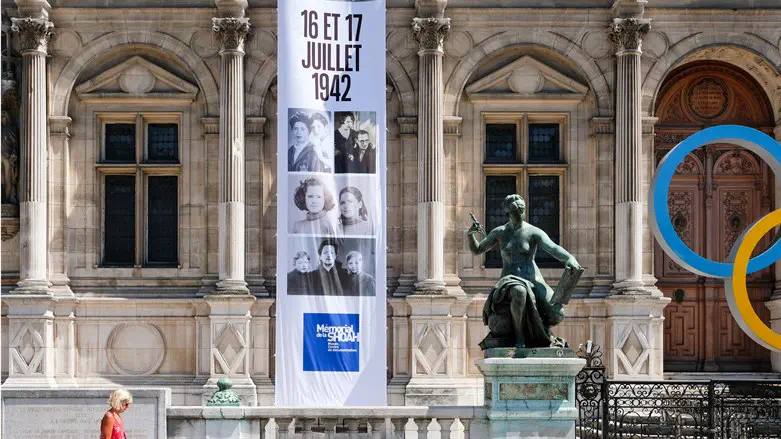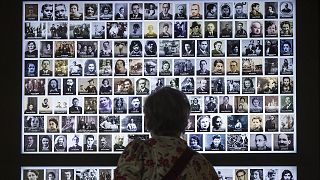President Macron visits site where Jews were detained during roundup, before being forced off to concentration camps.
Israel National News
Jul 18, 2022,

Paris Holocaust museum marks anniversary of Vel' d'Hiv Roundup
Reuters
France marked the 80th anniversary of a massive Holocaust-era round up of Jews this weekend, recalling the country’s most notorious act of collaboration with Nazi Germany during the Vichy government.
President Emmanuel Macron travelled Sunday afternoon to Pithiviers, south of Paris, for a visit to a site used to house Jews rounded up in July 1942, and an adjacent train station, through which the Jews were sent to concentration camps.
Macron’s visit comes on the secondary of the anniversary of the infamous Vel' d'Hiv Roundup, during which authorities in Vichy France rounded up 13,152 Jews in and around Paris before transferring them to Nazi camps. Some 4,100 of those detained and deported during the roundup were children.
The roundup, conducted by Paris police and Vichy French Gendarmerie at the behest of Nazi forces occupying northern France, took place from July 16th to the 17th 1942.
Most of the Jews detained during the roundup were sent to Auschwitz.
Just 811 of those sent to the death camp survived to return to France after the war.
French Prime Minister Elisabeth Borne took part in a ceremony in Paris marking the anniversary Sunday, ahead of a planned address by Macron in Pithiviers.
"France delivered more than 13,000 people to torture, hatred, and death," said Borne.
“It was our laws, it was our police,” Borne continued, calling the roundup the culmination of the “transition of France from a country that protects to a country that betrays itself.”
France marked the 80th anniversary of a massive Holocaust-era round up of Jews this weekend, recalling the country’s most notorious act of collaboration with Nazi Germany during the Vichy government.
President Emmanuel Macron travelled Sunday afternoon to Pithiviers, south of Paris, for a visit to a site used to house Jews rounded up in July 1942, and an adjacent train station, through which the Jews were sent to concentration camps.
Macron’s visit comes on the secondary of the anniversary of the infamous Vel' d'Hiv Roundup, during which authorities in Vichy France rounded up 13,152 Jews in and around Paris before transferring them to Nazi camps. Some 4,100 of those detained and deported during the roundup were children.
The roundup, conducted by Paris police and Vichy French Gendarmerie at the behest of Nazi forces occupying northern France, took place from July 16th to the 17th 1942.
Most of the Jews detained during the roundup were sent to Auschwitz.
Just 811 of those sent to the death camp survived to return to France after the war.
French Prime Minister Elisabeth Borne took part in a ceremony in Paris marking the anniversary Sunday, ahead of a planned address by Macron in Pithiviers.
"France delivered more than 13,000 people to torture, hatred, and death," said Borne.
“It was our laws, it was our police,” Borne continued, calling the roundup the culmination of the “transition of France from a country that protects to a country that betrays itself.”
France remembers its horror of sending 13,000 Jews to Nazi death camps during Vel d’Hiv deportations
By Daniel Bellamy with AP • Updated: 17/07/2022 -

Memorial at the Winter Velodrome in Paris where Jews were rounded up in 1942.
Serge Klarsfeld, a renowned Nazi hunter whose father was deported to Auschwitz, spoke on Saturday in the garden, calling it an "earth-shaking testimony to the horrors lived by Jewish families."
He stressed the urgency of passing on living memory. "The youngest of us are in our 80s," he said of the children of deportees.
Anxiety has worsened for some since the far-right National Rally party made a surprising electoral breakthrough last month, winning a record 89 seats in France’s National Assembly.
Party co-founder Jean-Marie Le Pen has been convicted of racism and downplaying the Holocaust. His daughter Marine, who now leads the party, has distanced herself from her father’s positions, but the party’s past still raises concerns for many Jews.
"The policy, from 1942 onward, was to organize the murder of the Jews of Europe and therefore to organize the deportation of the Jews of France," said Jacques Fredj, director of the Paris Shoah Memorial.
"Most of the time, the decisions were made by the Nazis and implemented by the French administration," he said. "But the management was French, Gendarmes or policemen were managing and supervising."
By Daniel Bellamy with AP • Updated: 17/07/2022 -

Memorial at the Winter Velodrome in Paris where Jews were rounded up in 1942.
- Copyright AFP
Family by family, house by house, French police rounded up 13,000 people in central Paris on two terrifying days in July 1942. Then they sent them to Nazi death camps simply because they were Jewish.
Eight decades later, France is honouring the victims and trying to keep their memory alive.
A week of ceremonies marking 80 years since the Vel d’Hiv police roundup on 16-17 July 1942 ended on Sunday with a speech by President Emmanuel Macron at the railway station where the Jews were sent to their deaths in Nazi Germany.
The raids were among the most shameful acts undertaken by France during World War II and one of the darkest moments in its history.
Over those two days, police herded 13,152 people -- including 4,115 children -- into the Winter Velodrome of Paris, known as the Vel d’Hiv, before being sent to Nazi camps.
It was the most extensive roundup of members of the Jewish community in western Europe. The children were separated from their families, and only a very few survived.
Survivors ask, 'Can you imagine?'
In public testimonies over the past week, survivor Rachel Jedinak described a middle-of-the-night knock on the door, and being marched through the streets of Paris and herded into the velodrome in the shadow of the Eiffel Tower.
She recalled her desperate mother shouting at the police. Some neighbours informed on Jews, while others wept as they watched them corralled like livestock, she said.
Chantal Blaszka’s aunts and uncle were among the children rounded up: 6-year-old Simon, 9-year-old Berthe, and 15-year-old Suzanne. Their names are now engraved on a monument in a garden where the velodrome once stood, along with some 4,000 other children targeted in the raids.
Photos of the children hang from tree trunks, the result of years of painstaking research to identify and honour the long-anonymous victims.
Of the children deported from the winter velodrome in Paris where they were gathered, only six survived.
"Can you imagine?" Blaszka asked, pointing at the names and shaking her head. "Can you imagine?"
Family by family, house by house, French police rounded up 13,000 people in central Paris on two terrifying days in July 1942. Then they sent them to Nazi death camps simply because they were Jewish.
Eight decades later, France is honouring the victims and trying to keep their memory alive.
A week of ceremonies marking 80 years since the Vel d’Hiv police roundup on 16-17 July 1942 ended on Sunday with a speech by President Emmanuel Macron at the railway station where the Jews were sent to their deaths in Nazi Germany.
The raids were among the most shameful acts undertaken by France during World War II and one of the darkest moments in its history.
Over those two days, police herded 13,152 people -- including 4,115 children -- into the Winter Velodrome of Paris, known as the Vel d’Hiv, before being sent to Nazi camps.
It was the most extensive roundup of members of the Jewish community in western Europe. The children were separated from their families, and only a very few survived.
Survivors ask, 'Can you imagine?'
In public testimonies over the past week, survivor Rachel Jedinak described a middle-of-the-night knock on the door, and being marched through the streets of Paris and herded into the velodrome in the shadow of the Eiffel Tower.
She recalled her desperate mother shouting at the police. Some neighbours informed on Jews, while others wept as they watched them corralled like livestock, she said.
Chantal Blaszka’s aunts and uncle were among the children rounded up: 6-year-old Simon, 9-year-old Berthe, and 15-year-old Suzanne. Their names are now engraved on a monument in a garden where the velodrome once stood, along with some 4,000 other children targeted in the raids.
Photos of the children hang from tree trunks, the result of years of painstaking research to identify and honour the long-anonymous victims.
Of the children deported from the winter velodrome in Paris where they were gathered, only six survived.
"Can you imagine?" Blaszka asked, pointing at the names and shaking her head. "Can you imagine?"
Serge Klarsfeld, a renowned Nazi hunter whose father was deported to Auschwitz, spoke on Saturday in the garden, calling it an "earth-shaking testimony to the horrors lived by Jewish families."
He stressed the urgency of passing on living memory. "The youngest of us are in our 80s," he said of the children of deportees.
Anxiety has worsened for some since the far-right National Rally party made a surprising electoral breakthrough last month, winning a record 89 seats in France’s National Assembly.
Party co-founder Jean-Marie Le Pen has been convicted of racism and downplaying the Holocaust. His daughter Marine, who now leads the party, has distanced herself from her father’s positions, but the party’s past still raises concerns for many Jews.
"The policy, from 1942 onward, was to organize the murder of the Jews of Europe and therefore to organize the deportation of the Jews of France," said Jacques Fredj, director of the Paris Shoah Memorial.
"Most of the time, the decisions were made by the Nazis and implemented by the French administration," he said. "But the management was French, Gendarmes or policemen were managing and supervising."
No comments:
Post a Comment